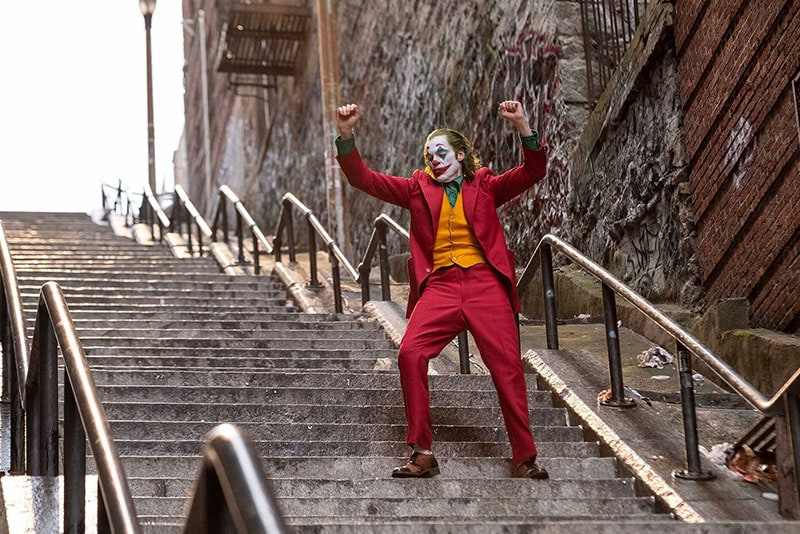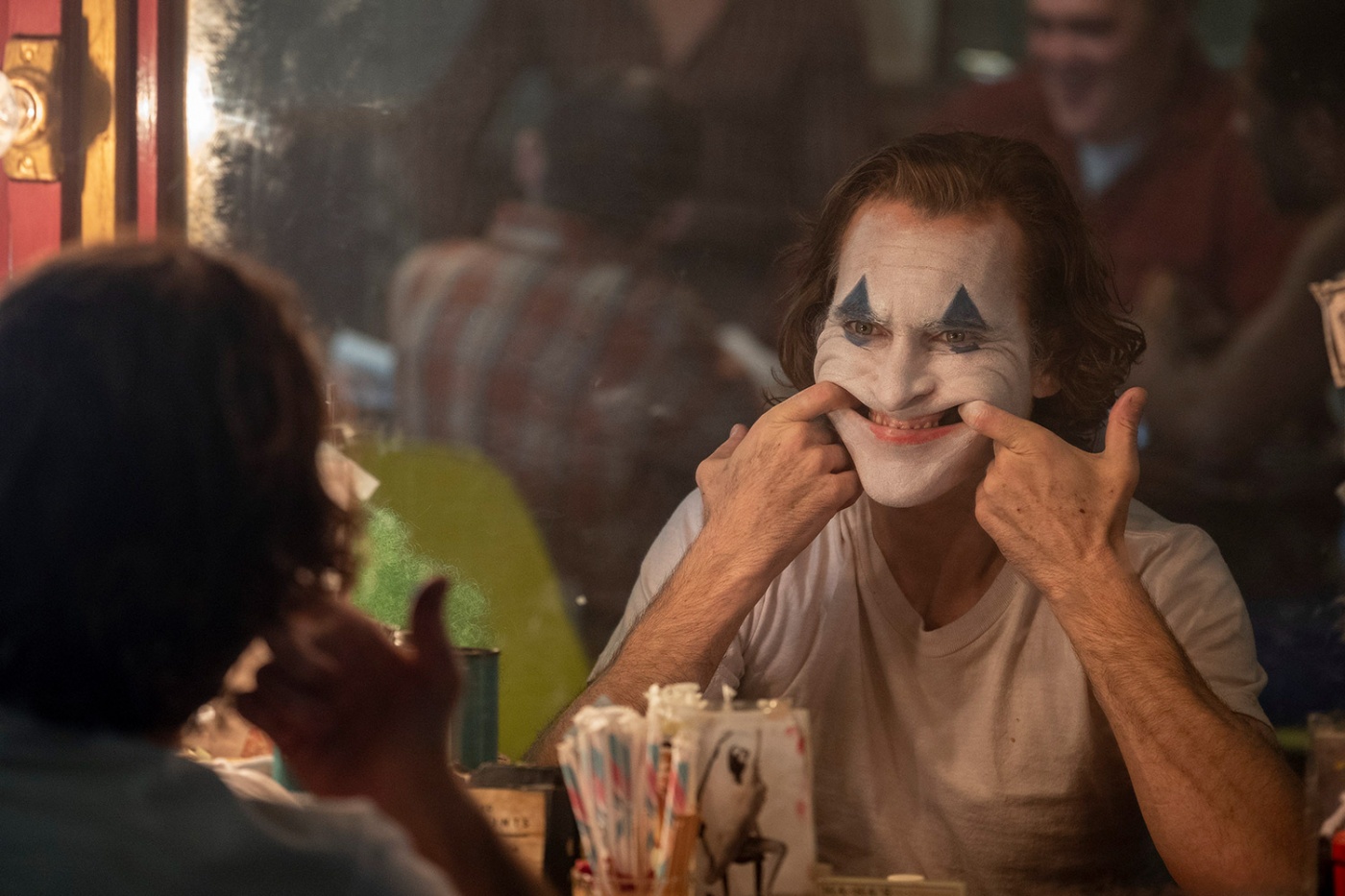Film Review: Joker Unsettles and Stretches Itself Thin
Joker is predicted to gross more than $1 billion dollars worldwide. Still, I found myself uncomfortable and disturbed while sitting in the theatre. If a good film is simply meant to incite a reaction, Joker passes the test.
Directed by Todd Phillips, the dark comic book-based film follows part-time clown and aspiring comedian Arthur Fleck, played by Joaquin Phoenix, amidst a trash-flooded, inequality stricken setting. His medical condition—an involuntary and sporadic high-pitched cackle often leads to him being angrily outcasted. With bones jutting out of his thin frame, Phoenix’s performance is chilling and theatrical. While making funny faces with a child on the bus, Fleck is scolded by the child’s mother and begins laughing uncontrollably at this awkward admonishment of a friendly, well-intended interaction. The ambivalence between jocularity and ridicule oftentimes play off each other, taking a more insidious tone.
Phillips tries to draw on themes of existential dread as well. Fleck’s misplaced laugh underscores the blight of his loneliness and isolation, pointing out the absurdity of life so much so that it becomes a laughing matter. “I used to think my life was a tragedy, but now I realise it’s a comedy,” he admits. The opening scene captures this tension within Fleck, an important central theme, as he forces his face into the smiling and crying masks of the tragic and the comic. The character’s alienation seems to represent the discord people experience in the world, as intrinsically meaning-making beings who suffer through a persistent disharmony with the meaningless and amoral universe. According to Albert Camus, “Living, naturally, is never easy,” which is also subtly conveyed through the ominous aesthetic that lends itself to the growing uneasiness as the character unravels before your eyes.
Witnessing Fleck trudge up the seemingly never-ending stairs to get to his apartment day after day, one is reminded of Sisyphus rolling the rock up the hill. Camus also pinpoints Sisyphus’ descent to retrieve the rock and writes: “At each of those moments when he leaves the heights and gradually sinks toward the lairs of the gods, he is superior to his fate.” It is the very awareness of the pointlessness of his task that grants Sisyphus victory, allowing him to be rebellious. Likewise, in the pivotal scene where Fleck prances gracefully down the stairs, face painted but finally unmasked, he symbolically kicks into life—vindicated.

This is where the controversy lies. Some have claimed that the box office hit is a how-to guide for mass shooters. It is strongly influenced and modelled after Taxi Driver, also based on a lonely man who seeks violence as catharsis. Isolated and frustrated, Travis Bickle and Arthur Fleck both struggle in the margins of society. The attempted assassination of President Ronald Reagan was committed by a man obsessed with imitating and becoming Scorsese’s fictional creation. In court, Hinckley’s counsel mounted a defense of insanity by playing the film for the jury from beginning to end. It is no surprise that Joker, with its strong references to Scorsese’s classic, would cause an uproar.
As such, the audience is tasked with confronting the human behind the villain. Everything lends itself to trying to make the viewer feel what he feels; injustice, incivility, inequality. You get the sneaking feeling that everyone sucks and nothing means anything. And that is why it’s so disturbing. The audience is promised a tour of the Joker’s psyche only to be stopped at the first level.
Ultimately, everything becomes somewhat gratuitous. The screen bleeds ‘modernity has failed us’ in Marx’s handwriting. Phillips is very aware of the genre he is breaking down, trying very hard to make a serious film noir-esque piece of cinema out of a neon-haired clown. The slow cello playing in the background throughout compounds the intensity and dramatic darkness. It’s in these superficial ways that the film attempts to convey the maligned, misanthropic character as tragic and deserving of our humblest pity as opposed to comically pathetic in his own delusional sense of self-importance.
The Joker’s conceit is confirmed by his riotous celebration. In the final scene, as Fleck rises above the mass of clown-masked anarchists, he is applauded—and admired. In Taxi Driver, Bickle’s heroism is purely accidental and the irony lies in him being celebrated as a hero. Any idolisation of him is, by the film’s own principle, foolish. The parallels that Phillips draws between the two lonely and ignored characters is an attempt to bring out reflective commentary but it doesn’t quite meet the same level of complexity. Instead, Joker simply condemns the capitalist class and congratulates itself.
While it may be problematic and not very subtle, it is unquestionably topical. Protests against the establishment and the powerful are happening with vigour and tenacity all over the world: Lebanon, Hong Kong, Egypt, the US, just to name a few. There is this strange overlap between the intense character study and an underlying commentary on the elusive society that the Joker reacts to, neither of them fully meeting any persuasive resolution.
What’s more, the film tries to explain the supervillain by doing very little. The designated exploration of Fleck’s motivations and psychology are addressed with vague and opaque references to medication, brief social worker visits, and the discovery of a troubling childhood. The sombre melancholy of every tightly shot frame, though aesthetically gripping, can’t carry the entire narrative either. Delving into the psychology of one person but seeing only darkness is one-dimensional and that doesn’t necessarily equate to meaningful depth or insightful art.
Image Credits: Warner Bros.


